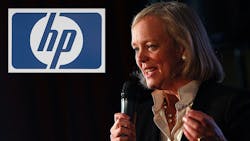Hewlett Packard Enterprise Rises After Shedding Services Unit
Hewlett Packard Enterprise Co. jumped in early trading Wednesday after the company said it will spin off and merge its business-services division with Computer Sciences Corp. in a deal valued at $8.5 billion for HPE shareholders.
Meg Whitman is taking further steps to unwind the collection of computer assets she inherited when she took the helm of Hewlett-Packard Co. in 2011, keeping up her efforts to trim the Silicon Valley giant into a more nimble company.
The plan, announced Tuesday, is the latest in Whitman’s drive to focus the company, which sells corporate computers and software, on the most promising and faster-growing businesses while hiving off billions in acquisitions and assets, including some built up by her predecessors.
After breaking off the lackluster personal-computer and printer units into a separate company last year, the CEO is still reshaping HP Enterprise to boost growth amid new competition in the cloud from rivals such as Amazon.com Inc. The deal with CSC means Whitman is now exiting the market for information technology outsourcing, which helps customers manage and upgrade their systems, leaving her to concentrate on selling hardware that covers servers, storage and networking, along with software and some specialized services.
“Back in the day, I think being an IT supermarket was a good strategy — scale was important,” Whitman said. “But a lot of things that built a competitive moat five, 10, 15 years ago actually don’t today.”
CSC CEO Mike Lawrie will lead the new company. Tysons, Virginia-based CSC, whose main business is IT services, will serve HP Enterprise’s existing customers, and the deal is expected to generate $1 billion in cost savings in its first year. Whitman will have a seat on the new company’s board, which will be split evenly between directors nominated by each company.
Hewlett-Packard expanded its services business in 2008, when the company purchased Electronic Data Systems for about $13 billion. Yet enterprise-services division revenue declined to $19.8 billion in fiscal 2015, compared with about $26 billion in 2012.
“The enterprise services segment for the company had been an area that had been underperforming,” said Shebly Seyrafi, an analyst at FBN Securities, noting that HP Enterprise didn’t get a premium price for the services business. “They just haven’t really done well, I would say, with that acquisition.”
Separately, HP Enterprise said fiscal second-quarter profit excluding certain items was 42 cents a share, on revenue of $12.7 billion. Analysts on average had projected profit of 42 cents on sales of $12.3 billion, according to data compiled by Bloomberg. In the current period, which ends in July, profit will be 42 cents to 46 cents, the Palo Alto, California-based company said Tuesday in a statement. That compares with an average estimate of 48 cents.
Revenue in the Enterprise Group, HP Enterprise’s largest unit, posted a 7% gain from a year earlier to $7 billion. Sales in the Enterprise Services division being combined with CSC fell 2% in the April quarter to $4.7 billion.
The Cusp of Consolidation
Improvements in the services business make it a good time to make the move with the spinoff and merger, Whitman said on a conference call. And perhaps more important, the industry is on the cusp of consolidation, and it’s better to be at the forefront than playing catch-up, she said.
The new company, whose name will be announced later, could also buoy sales of HP Enterprise products, because the company didn’t previously have broad access to CSC’s business for its hardware gear, Whitman said.
There’s not a lot of client overlap, Lawrie said, with less than 15% of shared customers among top accounts. He said the new company is well-positioned for growth as a combined entity.
“Together, as an agile technology independent services pure play, we will be better positioned to innovate and compete and win against both emerging and established players,” he said on the call. “We will have substantial scale to serve customers more efficiently and effectively worldwide.”
The transaction will consist of a tax-free spinoff of the HP Enterprise unit and merger with CSC. The $8.5 billion value of the deal for HP Enterprise shareholders includes $4.5 billion in stock in the newly combined company, a $1.5 billion cash dividend, and the $2.5 billion transfer of debt and other liabilities.
When Whitman took over in 2011, Hewlett-Packard was reeling from years of acquisitions that failed to give it an edge in a quickly evolving technology industry — and she has since set about shedding some of the sluggish businesses built up by past CEOs. Carly Fiorina, who was ousted in 2005, led the company’s buyout of Compaq Computer Corp. in 2002 — a deal that made it more dependent on the PC market. Mark Hurd, who was CEO from 2005 to 2010, led the purchase of EDS to broaden the company’s services business.
Whitman said her company’s November split from PC and printer seller HP Inc. makes the new effort to separate the enterprise services business less daunting. She said many of the people who worked on the earlier split will work on this deal as well.
“This time,” Whitman said, “we have this thing down to a science.”
By Brian Womack
About the Author
Bloomberg
Licensed content from Bloomberg, copyright 2016.
